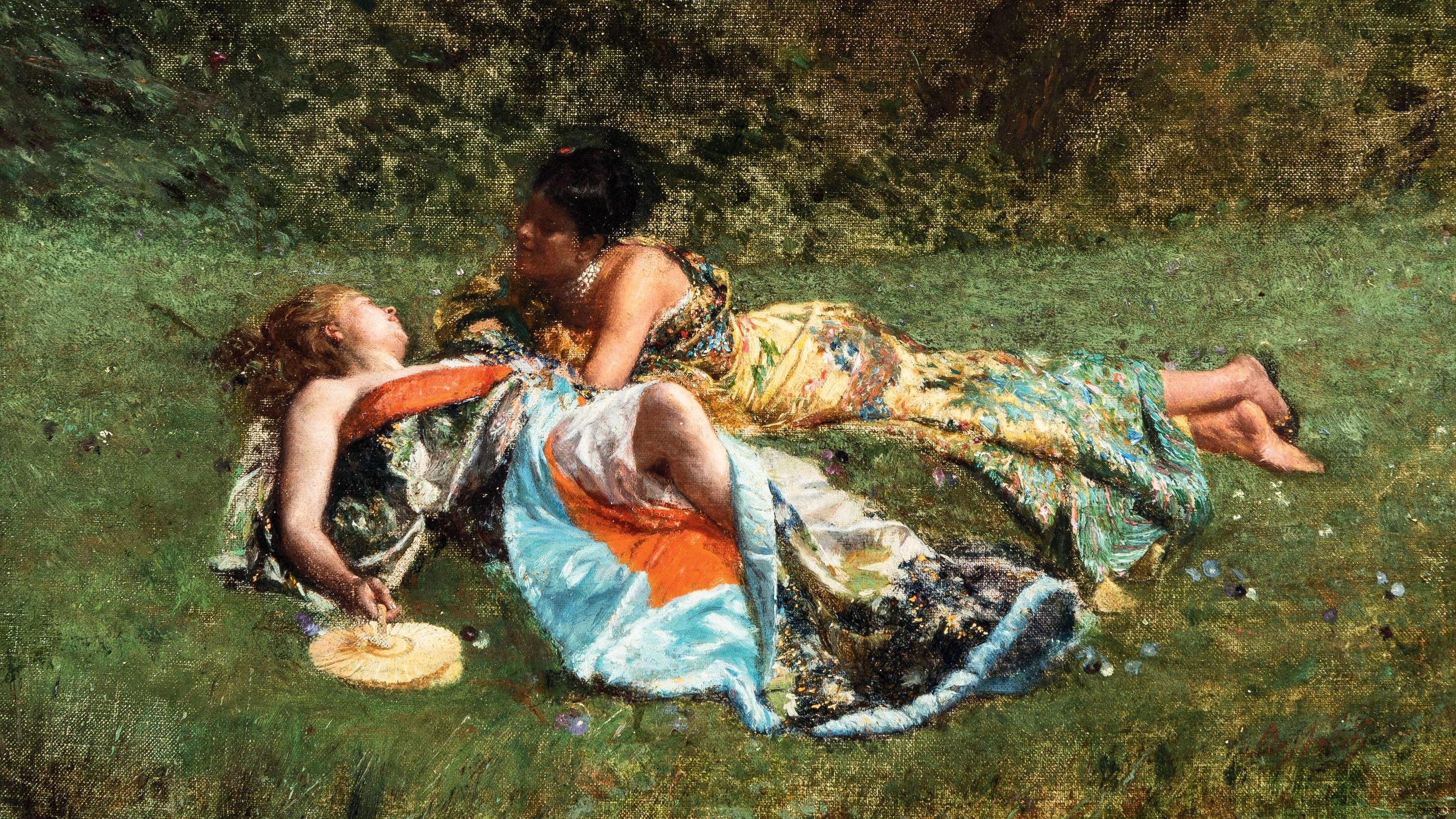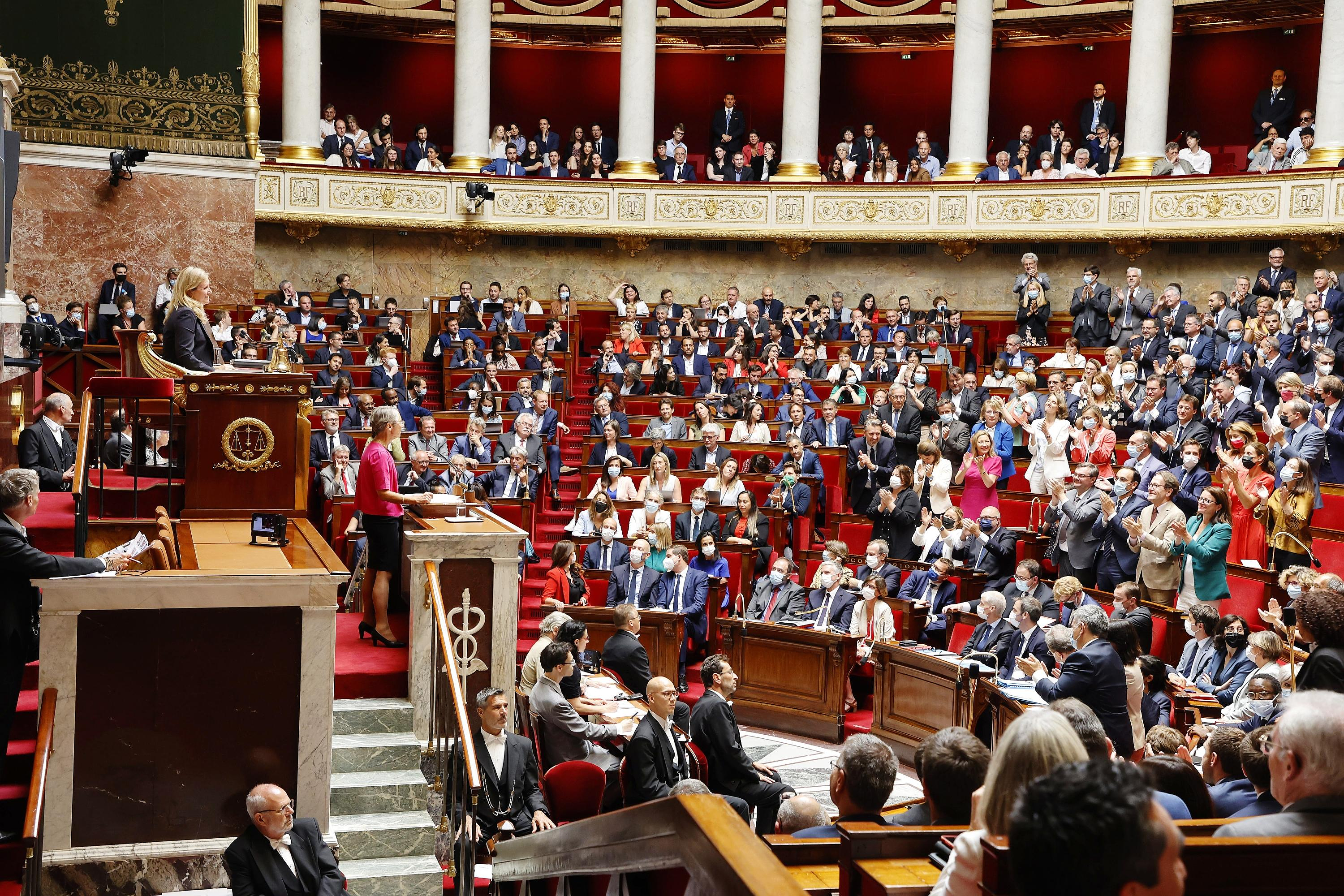This article is taken from the Figaro Hors-série Paris 1874, Impressionisme-Soleil levant, a special issue published one hundred and fifty years after the first impressionist exhibition commemorated by the Musée d'Orsay which brought together, in a striking face-to-face, a wide selection of works which were then revealed to the public. To be kept up to date with historical and cultural news, subscribe free of charge to the Lettre du Figaro Histoire.
Ah! how very happy they are to come back here for a new spring, and a second summer, far from the gray of Paris, in this country villa that they rent in La Jonchère, not far from Bougival. Giuseppe is in love. Of his wife and of France. He married Léontine on April 29, 1869, the day before his first exhibition at the Salon. Frédéric Reitlinger, the art dealer with whom he signed his very first contract, was his witness. This contract brings him comfort which Léontine watches over. She has great ambitions for him, for his career and for their social life. She introduces him wherever she can and serves as his interpreter when his singing French is too insufficient. She apparently resembles the mother he lost when he was three years old and still living in sunny Italy.
The banks of the Seine are an enchantment for him, he who loves painting outdoors so much. Passion which once earned him his dismissal from the Academy of Fine Arts in Naples, where he skipped classes to go painting outside. Here, he paints every day “the dear landscapes, of the tender green of youth, and the almost gray willow groves of the banks and the transparent mists and the pale skies. (…) If all this is not my native land, it is the country we marry for love”. He goes to work on the water, from the morning, walks in the evening as night falls, and passes through fields, to shorten the route, carrying his wife in his arms on the days when it rained, "sure of my strength and happy to show it.” This changes him from what he does in Paris, where out of a desire to please and to make a place for himself, he mainly produces in the historical genre and the fashion launched by Fortuny of representing people in 18th century costume. Cecioni also sharply criticized him when he saw the two paintings he exhibited at the Salon this year: Woman with Parrots and An Intimate Reception. There is too much of Fortuny in it, not enough of himself, Giuseppe De Nittis, great lover of the skies. He understands and is resolved, he wants to be the interpreter of truth again.
Also read: Michel De Jaeghere: “Impressionism, an aesthetic revolution in the shadow of the old masters”
In the little house in La Jonchère, the table is always set and the couple invites everyone who comes to see them to dinner. “The meals were simple, but we were very cheerful. » Among the guests, there is Edouard Manet, whom they love very much, and his wife Suzanne. “No one is better, better educated, with more secure relationships. I never heard him say anything mean about anyone. He never caused any harm to an artist; to no one. We feared him because he found punchy words, of singular originality, the words of a kid from Paris, a kid of genius, who left an indelible mark on ridicule, vileness and mediocrity. He has this joyful mockery where the disdain is barely perceptible. A cheerfulness comes out of him, a communicative cheerfulness like all his laughing philosophy. I have always seen him like this. She is a sunny soul that I love. » The two artists share a love of reality, and also that of Japanese art, in vogue since the Universal Exhibition of 1867. Manet is keen on it, borrowing its oblong formats for his seascapes, usual for Japanese prints. , and liked to place a very beautiful screen in Zola's portrait. Giuseppe De Nittis will soon adorn the walls of his Parisian homes with them, where their friends, the Goncourts, the Daudets, Degas, Zola, Heredia, will flock…
Unfortunately, the new policies have darkened the cheerful picture of the start of summer. Manet, so patriotic, became more taciturn. He returns to Paris to get the dispatches. He supports it passionately: if the bad policies of the empire are the cause of evil, we must get rid of the empire, but not blame the army! To thank his host, he sends to De Nittis Au jardin, which he made in the flowering garden on Rue Franklin where the Morisots live. The young mother posing on the grass is Edma, sister of Berthe, who has just given birth to Jeanne. Next to her, their brother Tiburce. There is a bit of Berthe in this painting, a softness, something intimate, the touch a little trembling. In exchange, De Nittis sent him a pastel portrait of a young woman, with these few words: “My dear Manet, forgive this poor stranger who cannot tell you all the pleasure you have given him and who would so much like you pay back…” The war is here. Then the Commune. Manet first served in the National Guard, then in the artillery. And De Nittis leaves France for his hometown of Barletta.
Paris 1874. Impressionism, rising sun, Le Figaro Special Edition. €14.90, available on newsstands and on Figaro Store.

 Who was Dror Or, the Israeli father who died as a hostage in the hands of Hamas?
Who was Dror Or, the Israeli father who died as a hostage in the hands of Hamas? “Pay in cash”: at his trial, Donald Trump faced with an embarrassing recording
“Pay in cash”: at his trial, Donald Trump faced with an embarrassing recording Italy: a grandmother accidentally serves a bottle filled with wine to a baby, he has an alcoholic coma
Italy: a grandmother accidentally serves a bottle filled with wine to a baby, he has an alcoholic coma The mysterious skeletons of Hermann Göring's villa
The mysterious skeletons of Hermann Göring's villa Children born thanks to PMA do not have more cancers than others
Children born thanks to PMA do not have more cancers than others Breast cancer: less than one in two French women follow screening recommendations
Breast cancer: less than one in two French women follow screening recommendations “Dazzling” symptoms, 5,000 deaths per year, non-existent vaccine... What is Lassa fever, a case of which has been identified in Île-de-France?
“Dazzling” symptoms, 5,000 deaths per year, non-existent vaccine... What is Lassa fever, a case of which has been identified in Île-de-France? Sánchez cancels his agenda and considers resigning: "I need to stop and reflect"
Sánchez cancels his agenda and considers resigning: "I need to stop and reflect" Health carpooling, this source of savings which arouses the ire of patients and taxis
Health carpooling, this source of savings which arouses the ire of patients and taxis Tesla Model 3, MG4 and Dacia Spring.... With the end of the ecological bonus, these electric cars produced in China are seeing their sales fall
Tesla Model 3, MG4 and Dacia Spring.... With the end of the ecological bonus, these electric cars produced in China are seeing their sales fall For the 2024 Olympics, Airbnb commits to fighting prostitution in its accommodation
For the 2024 Olympics, Airbnb commits to fighting prostitution in its accommodation “Shrinkflation”: supermarkets obliged to alert their customers from July 1
“Shrinkflation”: supermarkets obliged to alert their customers from July 1 The electro of Justice and the echoes of Portishead
The electro of Justice and the echoes of Portishead 1924 Olympic Games: according to his daughter, the hero of Chariots of Fire was “not a bigot”
1924 Olympic Games: according to his daughter, the hero of Chariots of Fire was “not a bigot” The “German Brothel” in Yvelines: an uncertain future for the ruined residence
The “German Brothel” in Yvelines: an uncertain future for the ruined residence The eye of the INA: when Paul Auster visited Bernard Pivot
The eye of the INA: when Paul Auster visited Bernard Pivot Omoda 7, another Chinese car that could be manufactured in Spain
Omoda 7, another Chinese car that could be manufactured in Spain BYD chooses CA Auto Bank as financial partner in Spain
BYD chooses CA Auto Bank as financial partner in Spain Tesla and Baidu sign key agreement to boost development of autonomous driving
Tesla and Baidu sign key agreement to boost development of autonomous driving Skoda Kodiaq 2024: a 'beast' plug-in hybrid SUV
Skoda Kodiaq 2024: a 'beast' plug-in hybrid SUV The home mortgage firm rises 3.8% in February and the average interest moderates to 3.33%
The home mortgage firm rises 3.8% in February and the average interest moderates to 3.33% This is how housing prices have changed in Spain in the last decade
This is how housing prices have changed in Spain in the last decade The home mortgage firm drops 10% in January and interest soars to 3.46%
The home mortgage firm drops 10% in January and interest soars to 3.46% The jewel of the Rocío de Nagüeles urbanization: a dream villa in Marbella
The jewel of the Rocío de Nagüeles urbanization: a dream villa in Marbella Facing Jordan Bardella, the popularity match turns to Gabriel Attal’s advantage
Facing Jordan Bardella, the popularity match turns to Gabriel Attal’s advantage Europeans: a senior official on the National Rally list
Europeans: a senior official on the National Rally list Blockade of Sciences Po: the right denounces a “drift”, the government charges the rebels
Blockade of Sciences Po: the right denounces a “drift”, the government charges the rebels Even on a mission for NATO, the Charles-de-Gaulle remains under French control, Lecornu responds to Mélenchon
Even on a mission for NATO, the Charles-de-Gaulle remains under French control, Lecornu responds to Mélenchon These French cities that will boycott the World Cup in Qatar
These French cities that will boycott the World Cup in Qatar Monaco - Clermont: Minamino cornerstone, Fofana essential, the Clermont defense overwhelmed... The tops and the flops
Monaco - Clermont: Minamino cornerstone, Fofana essential, the Clermont defense overwhelmed... The tops and the flops Gymnastics: two gold medals for the Italian Manila Esposito during the European Championships
Gymnastics: two gold medals for the Italian Manila Esposito during the European Championships Champions Cup: in pain, Leinster beats Northampton and qualifies for the final
Champions Cup: in pain, Leinster beats Northampton and qualifies for the final Liga: Real Madrid crowned champion of Spain after FC Barcelona's defeat in Girona
Liga: Real Madrid crowned champion of Spain after FC Barcelona's defeat in Girona


















